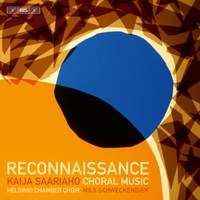Recording of the Week,
Choral works by the late Kaija Saariaho

Kaija Saariaho, who died in early June this year, turned her hand to many musical genres, from chamber music and orchestral compositions to operas; but one area of her work that is relatively unrepresented on recordings is her choral writing. A new album on BIS with the Helsinki Chamber Choir (whose 2019 recording of the atmospheric Vigilia by Rautavaara I consider one of the finest choral recordings ever made) under Nils Schweckendiek showcases Saariaho’s works for choir, both alone and with instrumental and electronic elements.
It’s book-ended by two versions of Nuits, adieux - the first with electronics and the second a cappella. The extended vocal techniques deployed by the singers from the outset combine with the angular line of the wordless vocalise to create a sound-world that can only be described as eerie (and perfectly attuned to the pointillistic eye-poetry of Jacques Roubaud, whose visual sparseness on the page creates a sense of halting half-formed thought). Saariaho’s nuits are a far cry from the sophisticated, bourgeois soirées that Emmanuel Despax was exploring at the piano a few weeks ago!

Écho! - a Renaissance-inspired choral tribute to Saariaho’s mentor Olivier Messiaen - strikes a more madrigalian, less fragmentary tone, with delicate imitative entries coming together in coordinated tuttis. The second movement, with its static blocks of discordant sound and its weightless, sighing glissandi that put me in mind of Vangelis’s evocative Blade Runner soundtrack, is perhaps a moment of relative calm; even so, the writing would surely tax the musicianship of the most accomplished choirs, but the Helsinki singers show they are more than equal to the task, here and elsewhere.
From French texts Saariaho now moves to German for Tag des Jahrs. Its four movements view the turning of the seasons through the complex and often bewildering poetry of Friedrich Hölderlin. Moments of real lyricism and emotive power are intercut with uncannily distorted voices, particularly in Der Sommer.
These texts are among those to which, for unclear reasons, Hölderlin gave fictitious dates of writing (including three predating his own birth); elsewhere in his work he would also locate poems in the future, and there’s a sense of connection with the work that gives the album its title, Reconnaissance from 2020, for chorus, percussion and double bass. Here, Saariaho too looks into the future, with a distinctly science-fiction-tinged perspective. This work was inspired in part by the sending-back of incredibly high-resolution images of the surface of Mars by the Curiosity rover.

Reconnaissance takes the form of what the sleeve notes call a ‘science-fiction madrigal’. A set of poems by Aleksi Barrière create a rich web of allusions - Philip Glass’s Koyaanisqatsi, Ray Bradbury’s Martian Chronicles, and more directly the 1972 Soviet cinema adaptation of Stanisław Lem’s influential sci-fi novel Solaris, dialogue from which is quoted in the third movement. There’s an altogether more cinematic feel to the tonal language here than in what’s gone before, with opening drones from the double bass that would not be out of place setting the scene in a sci-fi epic for the big screen.
Perhaps the most anarchic movement of all is Count Down, with a simultaneous countdown in six languages interwoven with an ambivalent stream-of-consciousness paean-cum-Jeremiad to humanity’s love-hate relationship with its home planet, its potential second planetary home, and indeed itself. No wonder the ensuing Solaris-inspired Interlude strikes a lonelier, calmer note.
Barrière does not seem terribly optimistic about the ultimate destination of all this - ending his quintet of texts with Requiem, quoting the Mass for the Dead and conjuring up something of the mood of Shelley’s Ozymandias on a planetary scale. Saariaho’s music is particularly apt at conveying a sense of empty desolation. As the ominous double bass drone returns, echoed by the lowest voices in the choir, there’s a feeling reminiscent of Holst’s Neptune - simply fading into the darkness.
Barrière’s closing evocation “What beauty!” aptly sums up the album - easy listening it most certainly isn’t, but there is an unmistakable stark, modernist beauty to Saariaho’s music that repays thoughtful attention, and which the Helsinki Chamber Choir capture perfectly; this album is a fitting postscript to a life of fearless musical exploration.
Helsinki Chamber Choir, Uusinta Ensemble, Nils Schweckendiek
Available Formats: CD, MP3, FLAC, Hi-Res FLAC



